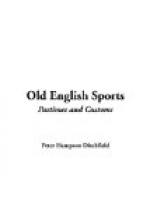“Welcome be Thou, heavenly
King,
Welcome, born on this
morning;
Welcome for whom we
shall sing
Welcome,
Yule.”
Herrick, who delighted so much in singing of
“Maypoles, hock-carts, wassails, wakes—”
then bursts out in joyous strains:
“Come, bring with a
noise,
My merry,
merry boys,
The Christmas log to
the firing;
While my
good dame, she
Bids ye
all be free
And drink to your heart’s
desiring.
With the
last year’s brand
Light the
new block, and
For good success in
his spending,
On your
psaltries play,
That sweet
luck may
Come while the log is
a-teending.”
We can fancy that we see the ceremony, the glad procession of retainers and servants, the lights flaring in all directions: we can hear the shouts and chorus of many voices, the drums beating and flutes and trumpets sounding. The huge hearth receives the mighty log, and the flames and sparks shoot up the gaping chimney.
At Court in olden times Christmas was kept right royally, if we may judge from the extensive menu of the repasts of King Henry III. and his courtiers in the year 1247. He kept his Christmas at Winchester Castle, and the neighbourhood must have been ransacked to furnish supplies for the royal table. The choice dainties were as follows: Boars, with heads entire, well cooked and very succulent, 48; fowls, 1900; partridges, mostly “put in paste,” 500; swans, 41; peacocks, 48; hares, 260; eggs, 24,000; 300 gallons of oysters; 300 rabbits, and more if possible; birds of various sorts, as many as could be had; of whitings, “particularly good and heavy,” and conger eels the same; a hundred mullets, “fat and very heavy.” For bread the king paid L27 10s., at the price of four loaves to the penny. When the king kept his Christmas at York in 1250, the royal treasury must have been very full, for he ordered for the royal banquets 7000 fowls, 1750 partridges, besides immense numbers of boars, swans, pheasants, &c. Of course the king had a very large retinue of vassals and feudal lords to provide for; but the store seems sufficiently vast to supply the wants of an army of faithful, but hungry, subjects. Sometimes, when the king was short of money, there was a considerable reduction in the amount of good things consumed at Christmas.




